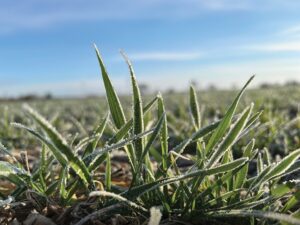Research Roundup
—
New advances in winter wheat breeding
Samantha Beattie
The wait for the perfect wheat has been substantially shortened. Dr. Duane Falk from the University of Guelph has developed a winter wheat type that does not require the usual three to 12 week vernalization process.
“We can make even more progress in developing high yielding, high quality and disease resistant winter wheat because we will have more generations in a shorter time period and, therefore, more opportunities,” says Falk.
Vernalization is a unique, natural process designed to ensure that flowering does not take place in the fall, but rather in the spring and summer. For example, despite being planted in the fall, winter wheat will not produce heads and seed until it has been exposed to a significant cold period. When that cold period ends, the plant can start heading and will produce grain.
The vernalization trait also carries over to the lab, making the development of new strains of winter wheat difficult. Researchers face significant time constraints when they have to simulate vernalization by placing winter varieties in a cold chamber, delaying research for weeks or even months.
But Falk was able to remove this trait by crossbreeding winter wheat with spring wheat, which doesn’t require vernalization. Now Falk can significantly speed up his research. With this new type he can grow three winter wheat generations in a single year, whereas before he could only grow one.
This research is funded by Grain Farmers of Ontario, Agriculture and Agri-Food Canada through the Developing Innovative Agri-Products program and the Canadian Field Crop Research Alliance. •
Getting SMARTer yields
Samantha Beattie
Grain Farmers of Ontario is behind a SMART (Strategic Management Adding Review Today) initiative to improve profitability and yield in wheat and soybean crops. University of Guelph researchers and the Ontario Ministry of Agriculture, Food and Rural Affairs are conducting the research and they’re seeing superb early results.
OMAFRA soybean specialist Horst Bohner, OMAFRA cereals specialist Peter Johnson and University of Guelph field crop agronomist David Hooker, are experimenting with many variables such as nitrogen application rates and timing for wheat and numerous other inputs for soybean production.
“We are trying to improve first and foremost profitability,” says Bohner. “To achieve profitability we need to have a crop that yields more and meets quality standards.”
Among the projects being pursued are nitrogen application at two different times of the year to improve nitrogen efficiency and plant health. SMART’s overall results have been eye-opening, with a 20 to 40 percent wheat yield increase, and an eight to 10 percent soybean yield increase.
In addition to funding from Grain Farmers of Ontario, this project was funded by Agriculture and Agri-Food Canada’s Adaptation Programming and administered by the Agricultural Adaptation Council. •
Research Roundup is provided by members of SPARK (Students Promoting Awareness of Research Knowledge) at the University of Guelph’s Office of Research. For more information, contact a SPARK writer at 519-824-4120, ext. 52667.
























